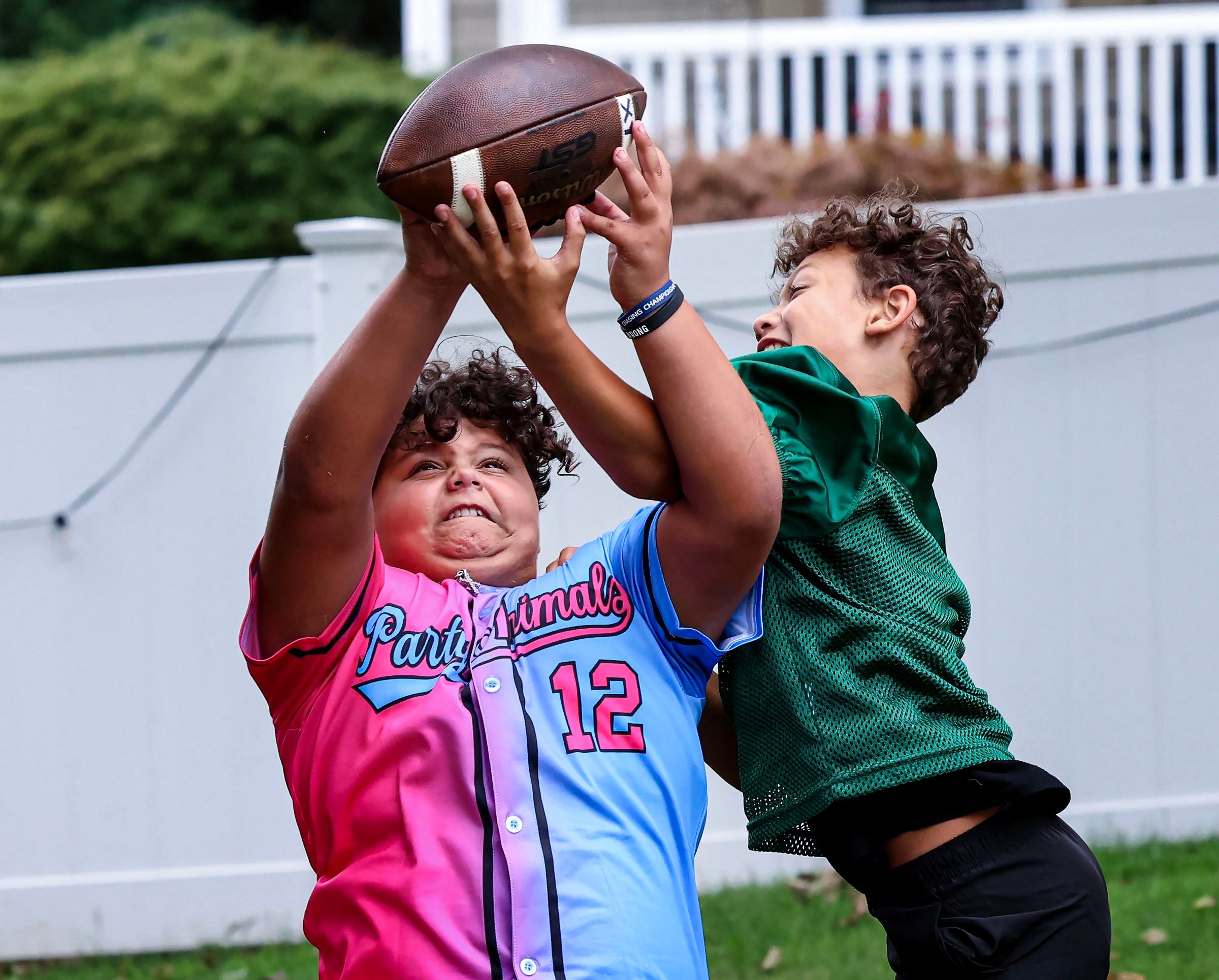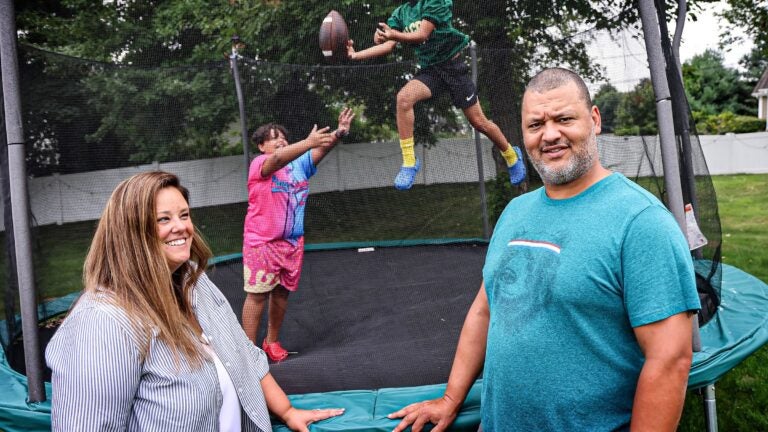Real Estate
“With the internet … everything’s a click away. … When I played high school athletics, I had no say in where we ended up.”
Erin Yarbough and her family are on the move — in more ways than one.
Their lives revolve around a steady stream of team practices and games for her two sons, who play practically every sport one can imagine.
Twelve-year-old Elijah loves baseball. Xavier, 11, plays football year round. Both also have picked up wrestling, soccer, and basketball. They play on travel teams.
So when Yarbough and her husband began looking for their home in 2022, they considered not only the typical factors prospective home buyers factor in when choosing where to put down roots, but they also prioritized towns around each one’s local sports programs.
“It’s a part of our lifestyle. It’s what we do. Almost every day we’re running from one sporting event to another,” Yarbough said. “So I couldn’t imagine moving to an area that didn’t have anything — it would be miserable.”
That’s partially why her family ultimately left their home in Bristol, R.I., and settled down in Somerset last August, she said. The new Somerset Berkley Regional High School was completed in 2015, along with what Yarbough described as “state-of-the-art” athletic fields. (Somerset Berkley also ranked third in Dalton Division 3 this past school year.)
All of that helped seal the deal for the Yarboughs.
“As we think about, like, what do we want from middle school and from high school? We want to make sure that they’re in a school district that supports what they’re interested in,” Yarbough said.

While Yarbough noted that the sports offerings were not the sole consideration for their home search, it’s definitely a bit of a departure from what are often the go-to factors prospective buyers take into account — considerations such as taxes, the local school system, and, maybe, just how far their new digs are from the office.
But sports teams are something buyers are at least curious about, or so suggests information on Homes.com.
Schools included on the popular real estate listing website are given letter grades in a variety of areas — based on data Niche.com compiled — including teachers, academics, college prep, and, yes, sports. (Homes.com declined to comment for this story.)
Athletics and academics can be closely intertwined
So are local athletics programs a big consideration for families in Massachusetts looking to move?
Not quite — or, at the very least, it can be hard to tell, according to several athletic directors at some of the state’s high schools with top-notch sports teams who spoke with the Globe.
“Hopkinton is an interesting place because we have been building up in a lot of areas in the town, so there’s a lot of places to move to,” said Ricardo Andrade, the athletic director for Hopkinton schools. “But … I wouldn’t say it’s necessarily been directly because of our athletic programs. [It’s] more because of our schools.”
Emily Sullivan, athletic director at Dover-Sherborn High School, said she considers the school’s strong sports program to be “like a cherry or the icing on the cake” as high-performing athletics and schools that perform well academically “strongly go hand in hand together.”
“You see it even in college athletics. The best college athletes are typically 3.5 and above GPA students, because they are extremely hard-working,” Sullivan said. “You see that a lot at the high school level, too, and it’s certainly true at D-S.”
Home isn’t necessarily where the schools are
Even so, for some students, where they live isn’t actually relevant to where they attend school.
Several of the athletic directors pointed to how Massachusetts’ school choice program allows students to enroll in schools outside their hometown district.
Notably, not every school district in Massachusetts offers it: Those that do must decide each year whether to accept new out-of-town students and determine available seats by grade.
“Because we have the school choice piece, students are able to apply to come here without having to relocate,” said Andrew Crisafulli, the athletic director at Dartmouth High School.
“I think that has also been a positive thing for us,” he added. “I mean, the community we have here is shrinking. Our enrollment has gone down about 150 kids over five years, but many communities, especially in the public schools, are going through the same thing.”
Andy Hart, an on-air personality and columnist at WEEI sports radio, resides in Dartmouth, where his two teenagers each play several sports.
He said school choice “changed everything” for high school athletics.
“I do think sports is, you know, some part of [school choice for students],” Hart said. “Now, would those families have moved if school choice wasn’t an avenue for them? I don’t know because obviously … prices are pretty high in Dartmouth like they are in a lot of places, and I don’t know how many people could afford to do something like that.”
Similarly, the METCO program, developed in the 1960s to help integrate schools and provide enhanced opportunities for students, allows about 3,300 Boston and Springfield students to attend school in more than 30 districts outside the two cities, according to the state Department of Education.
Experts also pointed to a growing trend in recent years of public school student athletes leaving their home districts to attend and play for private preparatory and Catholic high schools — another option in which the town or city where a student resides is not relevant.
A pull far beyond Massachusetts — and close to home
In the 12 years Eric Scott has been the athletic director at Medfield High School, he has twice been “interviewed,” as he puts it.
“A couple of times where people were moving to the area, they had talked to me, whether they’re coming up from the South and playing football or coming from somewhere else and playing volleyball or soccer, they’ve talked to me about our athletic programs because people had mentioned to them that they were high achieving,” Scott said.
One of those phone calls came last year from an incoming New England Patriots coach who was moving to the area with his family, Scott said.
“I guess I shouldn’t say it’s that surprising now,” Scott said. “With the internet … everything’s a click away. I guess it’s much easier to kind of do those searches than in the past, but it’s a completely different world. When I played high school athletics, I had no say in where we ended up.”
In Hopkinton, the academic strength of the local schools has been a draw for a burgeoning community of immigrants from Southeast Asia, according to Andrade, who said he has received a handful of emails from international families inquiring about the district’s tennis, golf, and soccer teams.
Meanwhile, others here in the Bay State may be drawn to a particular community’s sports programs not just because of wins and losses, but something that’s perhaps a bit harder to grab ahold of than victory: nostalgia.
Crisafulli noted that there are many Dartmouth graduates who either stay in town or move back to send their children to the same schools they attended.
“I am constantly trying to ask and pick their brains of what made their experience in high school so special that they have the level of pride they still have as 45-year-olds, 47-year-olds, 50-year-olds in Dartmouth,” he said. “It’s interesting …. It’s a very special place.”
Now in his mid-40s, Hart moved back to town in his late 20s.
“There was definitely the pull of tradition, nostalgia” that led him back home, he said.
He added though: “I have always thought, and I still think, it offers a good mix of community, tradition, academics, athletics — like kind of the whole package that I guess a parent would be looking for.”
These days, his son, Jackson, an incoming senior, plays football and has played basketball and lacrosse before, while his daughter, Sydney, an incoming sophomore, plays volleyball, track, and lacrosse.
And even still, there remains something about high school sports that helps make a community, well, a community, as Hart knows well.
“We’re certainly not Texas around here, but people still go to high school football games,” Hart said.
Jackson is the quarterback of the football team, a position Hart said he has learned can still elicit a certain kind of intrigue from folks he bumps into around town.
And when the team’s having a good season, the crowds grow by the game, and chatter, hope, and anxious nerves ripple through town.
“In a day when I guess there are fewer and fewer things that actually bring communities together — so many issues and things sort of divide in half — I think high school sports is still something that a group can get behind,” Hart said. “You know, I can’t find many people that have something bad to say about a high school sporting event.”
Address newsletter
Get the latest news on buying, selling, renting, home design, and more.
